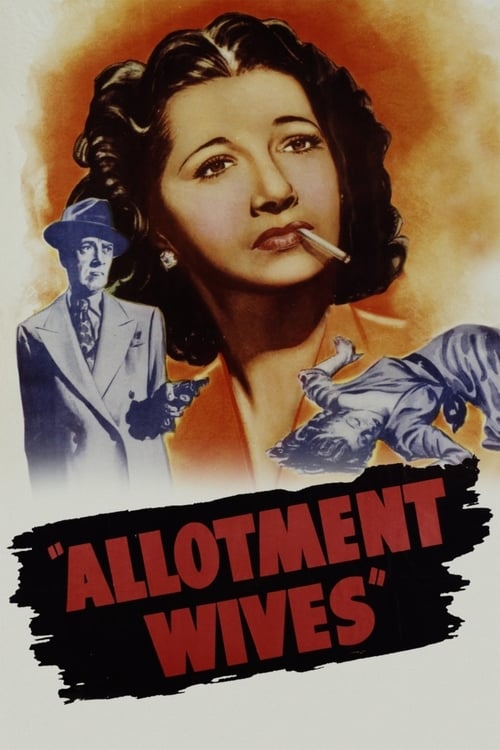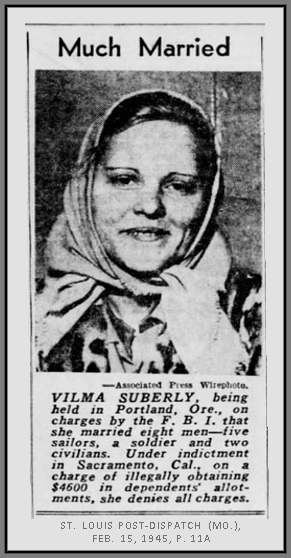![]()
 on 2/14/2025, 6:10 pm
on 2/14/2025, 6:10 pm
We'll see a number of essays in the NOIR OF THE WEEK archive from Guy Savage as we continue our reprints. Again, thanks to Steve-O for his dedication and generosity!
"Nice shooting...”
Crimes of social deviance always land the perps in the criminal Hall of Shame. Crimes for monetary gain, however, sometimes carry an aura of panache. Perhaps it’s the sheer boldness of the crime, the intelligence poured into planning or even the scale of the operation. Perhaps the average law-abiding Joe nurses an unfulfilled wish to game the system and sail off into the sunset loaded with cash, and perhaps this lends a certain glamour to crimes for financial gain.

But even with the division of various motivations for crime in mind, there are some bloodless crimes for monetary gain that seem particularly heartless, and that idea emerges in Allotment Wives, a 1945 B-crime film from director, William Nigh. This film explores the beaucoup bucks to be made bilking servicemen. The plan is really quite simple and taps into the slowly churning machine of national bureaucracy through the Office of Dependency Benefits (ODB). In some ways, since it’s the government that pays, this could be seen as a victimless crime, but in reality it’s the WWII servicemen, lonely and far away from home, facing death in the battlefields of Europe, who are the victims here.
Allotment Wives, Inc. is the name given to the nationwide syndicate at work bilking the government of millions of dollars, operates through bigamous marriages to servicemen. The syndicate is run by hard-as-nails Sheila Seymour (Kay Francis) and a handful of male handlers. These male handlers recruit girls and operate similarly to pimps. The girls are groomed to the scam and then placed in canteens where they meet lonely servicemen. With the spectre of war at everyone’s heels, there’s no time for slow romance, and so the servicemen marry girls they barely know and then go to war. Their brides, engaged in many bigamous marriages at once, turn over their benefits to their handlers, and the handlers in turn report to Sheila Seymour. These arrangements pay off in a different way if the servicemen die in the line of duty. Then the “jackpot” comes in the form of an insurance check.

Yes it’s a nifty, but grubby, little fraudulent scheme. The problem is that it’s so successful that even the Office of Dependency Benefits stirs from its bureaucratic slumber and smells a rat. The fraud “organized” cross-country on a big scale, has become a “major racket of huge proportions.” Squeaky clean Colonel Pete Martin (Paul Kelly) is summoned to the ODB and asked to investigate and told that the women who engage in bigamy may be fairly easy to catch, but they only “represent the fringe of a central organization that must be found and broken up.” Martin initially balks at the idea until he learns that one of his friends, now in Arlington Cemetery, was a victim of this scam.
With scenes depicting the relentless efficiency of monolithic government systems at work (similar to the 1949 film Trapped), the film begins with a heavy, preachy documentary style, and ends with the moral that servicemen should ‘know’ the women they marry. Sandwiched in between these two elements is an interesting character study, and even though the fraud committed against the servicemen seems particularly below the belt, nonetheless the hardened dame who runs the scheme is not portrayed altogether unsympathetically.
Sheila Seymour, the woman who runs Allotment Wives, Inc, is a woman from the wrong side of the tracks. Her criminal past is buried underneath sophisticated polish and charm. Similar to Lorna Hansen Forbes aka Ethel Whitehead (Joan Crawford) in The Damned Don’t Cry, there are a range of mythic rumours about her mysterious past. The rich business donors who are half in love with her repeat the stories that she was married to a Bavarian Prince or comes from Oklahoma oil money while they hand over $10,000 checks to sponsor her canteen. Her public persona is that of a wealthy, gently-spoken, charity-driven society woman who delights, charms and persuades affluent men to invest in her noble cause: the canteen she runs for lonely servicemen. Behind closed doors, in a hidden chamber from where she directs her criminal empire, we see a very different Sheila--decisive, cold and merciless. As we see Sheila operating, there’s the implicit idea that this is a woman who could have done anything she wanted, but hampered by poverty, she turned to crime.
Sheila’s right-hand-man is Whitey Colton (Otto Kruger), and while he appears to be a father figure to Sheila, there may be more than meets the eye. He’s the only man Sheila listens to, and she relies on him as she relies on no other. As with the other relationships at play in the film, the plot doesn’t dig into too much sordid detail. Similarly, we don’t see the slippery ethics of the new bigamous brides delivering sex to their servicemen husbands before they are shipped off to the front. Instead the women laugh and flirt safely in the canteen, and occasionally whoop it up on the dance floor.

Sheila’s Achilles’ heel is her daughter, Connie Seymour (Teala Loring), a budding young woman who can’t wait to explode into adulthood. Sheila has her daughter stashed (read locked up) in an elite girls’ school. Connie is willful yet innocent when it comes to the source of their income. She can’t understand why she’s locked up at school and not having fun like everyone else.
While Martin goes undercover as a newspaper reporter to crack the bigamous marriage ring, trouble also arrives in the form of mutiny in the ranks of Sheila’s minions coupled with the arrival of one of Sheila’s old partners in crime, Gladys Smith (Gertrude Michael). She recognizes Sheila and the blackmail begins. From here, the situation spirals out of control, and the bloodless crimes of bigamy and fraud escalate into bold, daylight murder.
Allotment Wives is a curious little film with some campy moments, but it’s fascinating for its depiction of the enemy at home running amuck while the soldiers fight at the front. There’s one scene where we are told that the scammers who run the bigamous marriage ring are “just like Japs or Germans—rotten to the core.” Digging out the enemy from within became, of course, a popular battle cry during McCarthyism, and while the targets of McCarthyism were innocent victims of Red Fury, nonetheless, the zest of the ODB towards digging out the insidious domestic enemy seems to foreshadow the shameful politics of the 50s.
The film can’t help exploiting the social tragedy involved--one woman hangs herself in a cell, for example, and there are tales of returning soldiers who discover that their new brides have vanished. But underneath all this, Sheila operates altering from one scene to another. In one minute, she’s a hard dame doling out the orders to her gang of hoods, and in the next, she’s just like any other mother worried about her delinquent daughter. The film isn’t going to win any prizes, and it’s a stretch to call this noir, but nonetheless this is an interesting study in female criminality. In the film’s dramatic conclusion, it’s clear that even squeaky-clean Martin admires the woman he was sent to destroy.


And if by chance you think the whole Allotment Wives thing is preposterous, the mother of Kathy Pettingill, the so-called Matriarch of the Melbourne crime family (watch Animal Kingdom), married at least six merchant seamen bigamously--largely for their pensions. The big difference here is that Kathy Pettingill’s mother was not part of a syndicate--she was a free-lancer.
There is a true-crime episode devoted to Kath(y) Pettingill, which you might be able to turn up with a bit of digging--bracing stuff!
https://www.imdb.com/title/tt1818546/
Responses